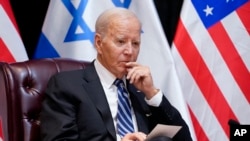With an Israeli ground invasion of Gaza looming, President Joe Biden is facing the challenges of balancing “unwavering” support for America’s closest ally in the Middle East with international demands for more robust protection for civilians in Gaza. He must also try to avoid a broader war in the Middle East.
Biden and his senior aides have been advising Israeli Prime Minister Benjamin Netanyahu’s government to consider the long-term impact of a strategy that calls for “mighty vengeance” on Hamas.
“The president left Tel Aviv confident that he had the opportunity to be candid and forthright with Prime Minister Netanyahu privately and with the war Cabinet writ large,” John Kirby, National Security Council coordinator for strategic communications, said Tuesday during a White House press briefing.
“He had the opportunity to ask them the hard questions that he wants them to be asking themselves before they start some sort of major ground offensive,” he added.
Biden has since spoken several times with Netanyahu, part of the administration’s push to buy more time to secure the release of hostages, the extraction of several hundred Palestinian Americans trapped in Gaza and delivery of much-needed basic supplies for civilians fleeing Israeli airstrikes.
A few dozen trucks have been allowed to pass through the Rafah Border Crossing with relief supplies to be distributed by U.N. agencies, in a deal that Bident facilitated between the governments of Netanyahu and Egyptian President Abdel Fattah el-Sissi.
So far, four hostages — two Americans and two Israelis — have been released from among the more than 200 people that Israeli officials say were abducted by Hamas during its coordinated attacks on Israeli soil on Oct. 7 that killed at least 1,400 people.
The militant group that controls the Gaza Strip cited Israel’s decadeslong occupation of the West Bank, Israeli police raids on al-Aqsa Mosque in Jerusalem, and the detention of thousands of Palestinians in Israeli jails as motivation for its attack.
Israeli airstrikes since Oct. 7 have killed more than 5,000 people in Gaza, according to the Hamas-controlled Ministry of Health, and has displaced more than a million people as they abide by Israeli evacuation orders.
Biden administration officials also want more time to prepare for attacks on U.S. interests in the region from Iran-backed groups such as Hezbollah in Lebanon and Houthis in Yemen, which are likely to intensify once Israel begins its ground invasion.
Even with additional U.S. military assets deployed to the region, Pentagon spokesperson Brigadier General Pat Ryder on Tuesday said at least 13 drone and rocket attacks have been launched against American forces in Iraq and Syria. However, officials say there is no indication of any state or nonstate actors preparing to escalate the conflict imminently.
Staunch support for Israel
Speaking at the United Nations Security Council meeting on Tuesday, Secretary of State Antony Blinken delivered a forceful defense of Israel's military actions. Describing Hamas’ atrocities, he urged council members to condemn the organization that Washington designated in 1997 as a foreign terrorist group.
“Where's the outrage? Where's the revulsion? Where's the rejection? Where's the explicit condemnation of these horrors?” Blinken implored.
Blinken repeated calls to protect civilian lives, issuing the administration’s strongest urging to Israel so far to “take all possible precautions to avoid harm to civilians.”
“It means food, medicine and water and other assistance must flow into Gaza and to the areas people need them,” he said. “It means civilians must be able to get out of harm's way. It means humanitarian pauses must be considered for these purposes."
Kirby clarified that a humanitarian pause is different from a cease-fire, which the administration believes will only benefit Hamas at this point.
He and other officials have been reluctant to characterize whether Israel has violated the laws of war or to determine whether the Netanyahu war Cabinet has clear and achievable military goals for its ground invasion and post-war agenda. The administration will not dictate operational steps and has not set any red lines for Israel, he said.
Meanwhile, domestic support is mixed.
A group of Republican senators has introduced a bill to redirect aid funds for Gaza to replenish Israeli's defensive “Iron Dome” system. Meanwhile progressive members of Congress are increasing pressure on Biden to call for a cease-fire.
“The majority of Americans are on the Israeli side. That may not continue if things get worse,” Steven Spiegel, director of the Center for Middle East Development at the University of California, Los Angeles, told VOA.
Josh Paul, who until last week was the director of congressional and public affairs at the State Department’s bureau that handles arms transfers and security assistance to foreign governments, resigned in protest over an administration policy that he said amounts to a green light for Israeli retaliation regardless of the toll on civilians.
“There's actually a Conventional Arms Transfer Policy that guides these decisions, which says that arms shall not be transferred when there is a more likely than not risk that they will be used to commit human rights violations,” Paul told VOA.
“As the Israeli operation in Gaza started with massive bombardments, we could already see hundreds and then thousands of Palestinian civilians dying. And yet there was no policy debate or questions about whether we were going to pause and take into account our regular policies and legal requirements,” he said.
Criticism at the UN
At the United Nations, where many member states support the Palestinian cause even as they express condemnation against Hamas’ actions, parallels have been drawn between the Russian invasion of parts of Ukraine and the Israeli occupation of Palestinian territories, said Richard Gowan, U.N. director of the International Crisis Group.
“Similarly, some diplomats, including Arab diplomats, have been highlighting what they see as double standards over the protection of civilians,” he told VOA. “They've been asking pretty pointedly, why Palestinian civilians don't deserve the same protection as Ukrainian civilians.”
Gowan noted that following a U.S. veto of a U.N. Security Council resolution to condemn violence against civilians and allow delivery of aid that did not include Israel’s right to self-defense, the administration has been “negotiating in good faith” as it drafts a new resolution that underlines that right.
He attributed Washington’s willingness to seek compromise as part of its effort to compete against China and Russia for the goodwill of countries of the Global South.
While the No. 1 U.S. priority is to defend Israel, he said, “a breakdown over Palestine can unravel a lot of the work” Washington has done to build better relations.
Carla Babb and Cindy Saine contributed to this report.






